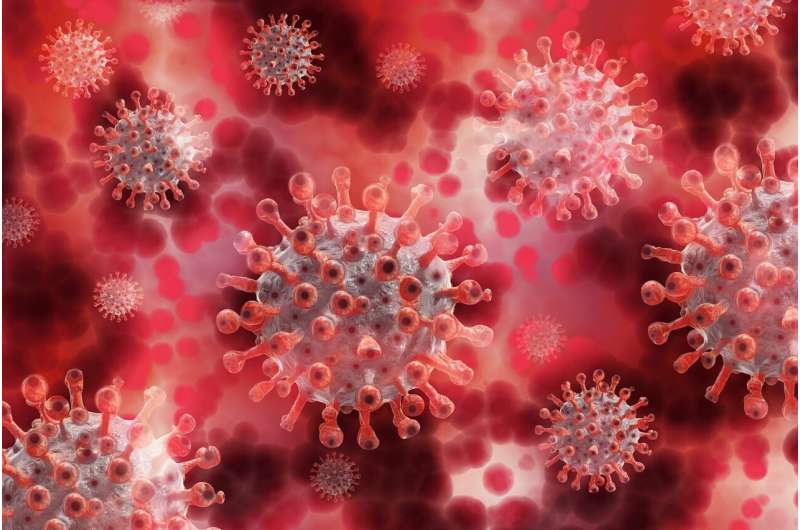Rapid emergence of new SARS-CoV2 variants due to the virus' ability to momentarily accelerate its evolutionary pace

New research led by the Doherty Institute has found the SARS-CoV-2 virus has the ability to momentarily accelerate its evolutionary pace, enabling variants to emerge more rapidly than other viruses.
Recently published in Molecular Biology and Evolution, the team, led by University of Melbourne Dr. Sebastian Duchene, an Australian Research Council DECRA Research Fellow at the Doherty Institute and lead author on the paper, found the virus that causes the disease COVID-19 is actually undergoing short-lived mutational bursts and then returning to its 'normal' rate.
Dr. Duchene explained that usually all viruses mutate at a fairly constant rate, with most taking a year or more to develop a new variant.
"However, what we were seeing with the variants of SARS-CoV-2, particularly the variants of concern, is that they have undergone many more mutations than we would expect under the normal evolutionary pace of similar coronaviruses," Dr. Duchene said.
"The Delta variant, for example, emerged within just six weeks from its ancestral form."
To understand why this was occurring, Dr. Duchene's laboratory conducted computational analyses of hundreds of genome sequences from SARS-CoV-2 strains to understand the mechanisms under which variants of concern emerge, with a focus on the first four: Alpha, Beta, Gamma and Delta.
"Initially it was believed that SARS-CoV-2 must have increased its evolutionary rate in general, but actually it's the virus's ability to temporarily increase its speed which is causing the difference in pace," Dr. Duchene said.
"It's like someone pumping the accelerator on a car."
Dr. Duchene said these bursts could be driven by a number of factors including prolonged infections in individuals, strong natural selection, which is enabling the virus to favor immune escape, or increased transmissibility with unvaccinated populations allowing the virus to rapidly spread and evolve.
The discovery highlights the importance of continued genome surveillance efforts to ensure early detection of new variants.
"With this virus evolving so rapidly, early detection is paramount in enabling us to monitor and respond to the virus," said Dr. Duchene.
He also stressed the need for increased vaccination.
"Anything we can do to have less virus out there will help reduce the probability that new variants will emerge."
The team of researchers included the Doherty Institute's Dr. Ash Porter, Dr. Wytamma Wirth and University of Melbourne Masters Student John Tay.
More information: John H Tay et al, The Emergence of SARS-CoV-2 Variants of Concern Is Driven by Acceleration of the Substitution Rate, Molecular Biology and Evolution (2022). DOI: 10.1093/molbev/msac013
Journal information: Molecular Biology and Evolution
Provided by The Peter Doherty Institute for Infection and Immunity





















